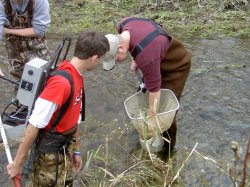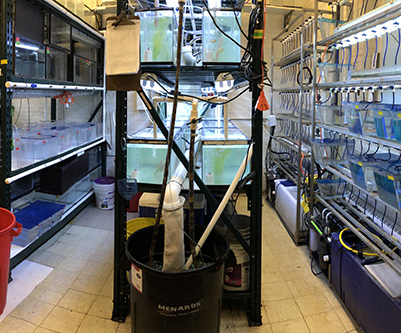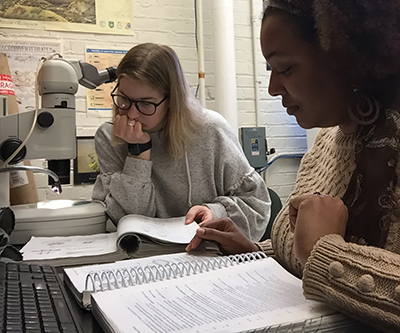Aquatic Ecology Research Lab

The Aquatic Ecology research lab, located on the West Lafayette campus in the Forestry Building rooms 113 and 114 (FORS 113/114), houses an aquatic rearing facility as well as a research laboratory.
Aquatic Ecosystems
The aquatic ecosystems group, under the direction of Dr. Reuben Goforth, uses a combination of manipulative field ecological studies and GIS spatial analyses to observe and model responses of aquatic communities to patterns and changes in watershed (streams, rivers and inland lakes) and shoreline (large rivers and Great Lakes nearshore areas) environmental properties over multiple spatial scales. Research studies also include the integration of temporal factors into spatially explicit models for determining community structure to enrich our understanding of aquatic community patterns and responses to perturbation (natural and anthropogenic) within multi-scale contexts of landscapes. Currently, there are four graduate students and four undergraduate students.
Research faculty


Lab Manager & More About Our Research
Matthew Hamilton
Fisheries & Aquatics Lab Manager
195 Marsteller Street
W. Lafayette IN 47906
Phone: 765.496.6266
Email: hamiltmt@purdue.edu
Learn about our nine Research Areas and meet our world-class faculty members.
FNR research centers seek to support and enhance the research and partnership enterprise at Purdue University. The centers are valued and encouraged as they create a venue for faculty to come together to pursue common goals. Forestry and Natural Resources faculty and staff are involved in six centers at the University.
The Department of Forestry and Natural Resources maintains an impressive collection of state-of-the-art research and education facilities. These labs, green houses, and educational facilities are a fundamental component that enables our faculty and students to learn, make new discoveries, and engage our clients in using these discoveries to sustain our nation’s ecosystems and natural resources.
